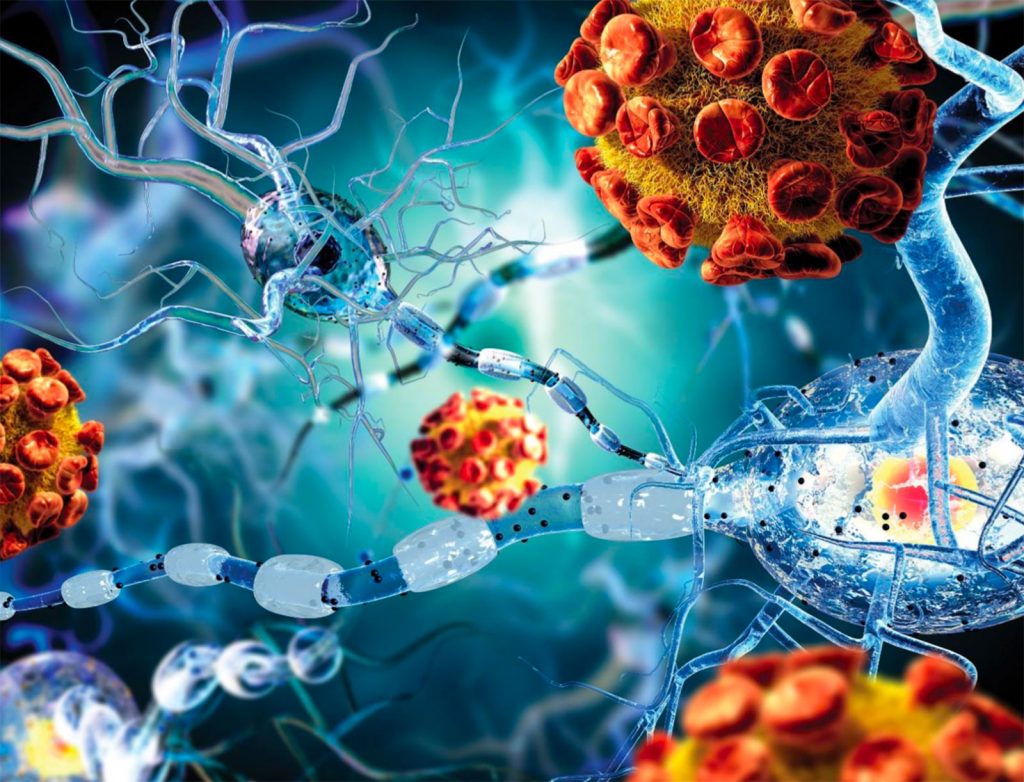
Autoimmune Diseases
An autoimmune disease is a condition in which your immune system mistakenly attacks your body. The immune system normally guards against germs like bacteria and viruses. When it senses these foreign invaders, it sends out an army of fighter cells to attack them.
Normally, the immune system can tell the difference between foreign cells and your own cells.
In an autoimmune disease, the immune system mistakes part of your body, like your joints or skin, as foreign. It releases proteins called autoantibodies that attack healthy cells. Our bodies have an immune system, which is a complex network of special cells and organs that defends the body from germs and other foreign invaders. Many diseases of the immune system, also known as autoimmune diseases, are more common in women than in men.
Overall, autoimmune diseases are common, affecting more than 23.5 million Americans. They are a leading cause of death and disability. Some autoimmune diseases are rare, while others, such as Hashimoto’s disease, affect many people.
For reasons that researchers are just beginning to understand, women are at a much greater risk than men of falling prey to an autoimmune disease, in which the body’s immune system turns paranoid and begins to attack one or more of the body’s organs.
The list of autoimmune diseases is long and varied, composed of more than 80 disorders afflicting virtually every sector of mortal flesh and function: the liver, the kidneys, the adrenal glands, the ovaries, the pancreas, the skin, the joints, the muscles, the myelin sheaths that buffer the nerves, the salivary ducts that spit, the tear ducts that weep.
Some of the conditions are cosmetically annoying but otherwise harmless, like vitiligo, in which patches of skin lose pigmentation. Others are debilitating yet manageable, while still others can be severe, progressive and even fatal.
Systemic scleroderma, for example, a disease of the connective tissue that results in hyperproduction of collagen, can sometimes wreak unstoppable havoc on the body’s organs, hardening them into wood-like uselessness.
And in all but a few autoimmune disorders, the sex ratio is wildly skewed toward women. In Hashimoto’s disease, for example, in which the immune system assaults the thyroid gland, the proportion of female to male victims is 50 to 1. For systemic lupus erythematosus, an inflammation of connective tissue, the ratio is 9 to 1; for Graves’ hyperthyroidism, 7 to 1. Even the less frankly ”feminine” immune diseases like multiple sclerosis and Type 1, or juvenile, diabetes strike twice as many women as men.
Chronic fatigue syndrome, also known as myalgic encephalomyelitis, or ME/CFS, and fibromyalgia (FM) are not autoimmune diseases. But they often have symptoms of some autoimmune disease, like being tired all the time and pain.
- ME/CFS can cause you to be very tired, have trouble concentrating, feel weak, and have muscle pain. Symptoms of ME/CFS come and go. The cause of ME/CFS is not known.
- FM is a disorder in which pain or tenderness is felt in multiple places all over the body. These “tender points” are located on the neck, shoulders, back, hips, arms, and legs and are painful when pressure is applied to them. Other symptoms include fatigue, trouble sleeping, and morning stiffness. FM mainly occurs in women of childbearing age. But children, the elderly, and men are sometimes can also get it. The cause is not known.
If you are living with an autoimmune disease, there are things you can do each day to feel better:
- Eat healthy, well-balanced meals. Make sure to include fruits and vegetables, whole grains, fat-free or low-fat milk products, and lean sources of protein. Limit saturated fat, trans fat, cholesterol, salt, and added sugars. If you follow a healthy eating plan, you will get the nutrients you need from food.
- Get regular physical activity. But be careful not to overdo it. Talk with your doctor about what types of physical activity you can do. A gradual and gentle exercise program often works well for people with long-lasting muscle and joint pain. Some types of yoga or tai chi exercises may be helpful.
- Get enough rest. Rest allows your body tissues and joints the time they need to repair. Sleeping is a great way you can help both your body and mind. If you don’t get enough sleep, your stress level and your symptoms could get worse. You also can’t fight off sickness as well when you sleep poorly. When you are well-rested, you can tackle your problems better and lower your risk for illness. Most people need at least 7 to 9 hours of sleep each day to feel well-rested.
- Reduce stress. Stress and anxiety can trigger symptoms to flare up with some autoimmune diseases. So, finding ways to simplify your life and cope with daily stressors will help you to feel your best. Meditation, self-hypnosis, and guided imagery, are simple relaxation techniques that might help you to reduce stress, lessen your pain, and deal with other aspects of living with your disease. You can learn to do these through self-help books, tapes, or with the help of an instructor. Joining a support group or talking with a counselor might also help you to manage your stress and cope with your disease.
Our Solution
- Adult Mental Focus – (Enhance mental awareness and mental focus).
- Fibromyalgia – (Designed to address pain associated with Fibromyalgia).
- Gluten Free – (Helps to balance and modify proteins, and help the immune system cross- react with the small-bowel tissue, which causes inflammation).
- Hashimoto’s – (The Hashimoto’s patch will aid and support the thyroid function while under attack).
- Leaky Gut, Celiac, Crohn’s – (Restores proper immune function at the cellular level, thus eliminating the autoimmune attack at the source).
- Liver/Gallbladder – (Helps regulate the communication between these two organs and helps with digestive problems).
- Migraine – (Assists in reducing migraine headaches that can cause intense throbbing).
- Relax – (Support the way the brain and body handle stress and pain).
- Stress & Anxiety – (Designed to reduce the everyday anxiety).
- Thyroid Plus – (Offers a balance between hormones, helps to release (TSH) hormones that control metabolism).
- Ultra Joint Plus– (Addresses joint specific issues and relieves discomfort).
Our technology is made as a complementary method of achieving behavioral responses. We are not in competition with standard medical practice or a medical procedure that uses traditional therapy. We make products that work on a different part on the body that triggers responses through electrical pathways to prevent disorders.





